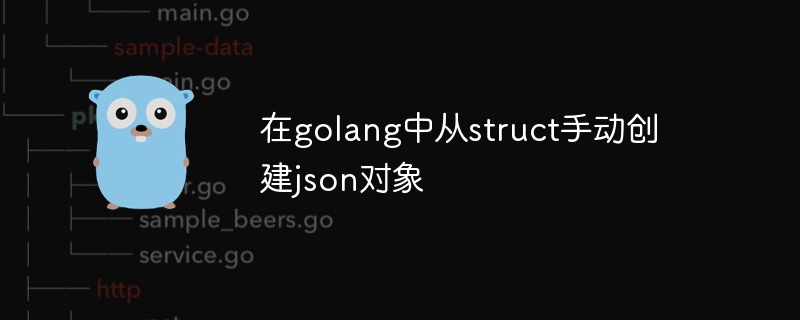在golang中从struct手动创建json对象

在golang中,从struct手动创建json对象是一项常见的操作。通过将struct转换为json格式,我们可以方便地在网络传输或存储中使用。在本文中,php小编香蕉将向您介绍如何使用golang的内置包来实现这一功能。不仅如此,我们还将探讨如何处理struct中的嵌套字段以及如何处理特殊类型的字段。无论您是初学者还是有经验的开发者,本文都将为您提供详细的指导,帮助您轻松地在golang中创建json对象。让我们开始吧!
问题内容
我有一个结构可以说
<code>type Foo struct {
A string `json:",omitemtpy"
}
</code>我知道我可以使用类似的东西轻松地将其转换为 json
json.Marshal(Foo{})它将返回一个空的 json 字符串。
但我需要使用相同的结构返回结构的 json 表示形式,其中包含所有字段和 json 中存在的“空值”。 (实际上,它是一个非常大的结构,所以我不能只保留没有标签的副本)
最简单的方法是什么?
基本上,我需要创建一个忽略 json omitempty 标签的结构的 json 编组。
此 json 创建不需要高效或高性能。
我更希望有一个库可以用于此类任务,但我见过的大多数库要么创建一些特殊格式,要么尊重 omitempty
编辑:
选择 https://stackoverflow.com/a/77799949/2187510 作为我的答案,并进行一些额外的工作以允许默认值(使用其代码作为参考)
defaultFoo := FoodWithPts{ Str: "helloWorld"}
dupFooType := dupType(reflect.TypeOf(defaultFoo))
foo := reflect.Zero(dupFooType).Interface()
// New additions
defaults, _ := json.Marshal(defaultFoo)
json.Unmarshal(defaults, &foo) // overwrites foo with defaults
// End New additions
data, err := json.Marshal(foo)
fmt.Println("dup FooWithPtrs:\n", string(data), err)输出:
dup FooWithPtrs:
{"String":"helloWorld","Int":0,"Bar":null} <nil>解决方法
您无法在运行时修改标签,但可以使用 $$c 在运行时创建结构类型$$reflect.StructOf()。
因此,我们的想法是复制结构类型,但在重复中从 JSON 标记中排除 ,omitempty<code>,omitempty 选项。
您可以在 Go Playground 上找到以下所有示例。
这比人们一开始想象的要容易。我们只需要递归地执行(一个结构体字段可能是另一个结构体),并且我们绝对应该处理指针:
func dupType(t reflect.Type) reflect.Type {
if t.Kind() == reflect.Pointer {
return reflect.PointerTo(dupType(t.Elem()))
}
if t.Kind() != reflect.Struct {
return t
}
var fields []reflect.StructField
for i := 0; i < t.NumField(); i++ {
sf := t.Field(i)
sf.Type = dupType(sf.Type)
// Keep json tag but cut ,omitempty option if exists:
if tag, _ := strings.CutSuffix(sf.Tag.Get("json"), ",omitempty"); tag == "" {
sf.Tag = ""
} else {
sf.Tag = `json:"` + reflect.StructTag(tag) + `"`
}
fields = append(fields, sf)
}
return reflect.StructOf(fields)
}让我们用这种类型来测试它:
type Foo struct {
Str string `json:"String,omitempty"`
Int int `json:",omitempty"`
Bar struct {
Float float64 `json:",omitempty"`
PtrInt int `json:",omitempty"`
Baz struct {
X int `json:"XXXX,omitempty"`
} `json:",omitempty"`
} `json:",omitempty"`
}首先,这是没有类型重复的 JSON 输出:
data, err := json.Marshal(Foo{})
fmt.Println("Foo:\n", string(data), err)输出:
Foo:
{"Bar":{"Baz":{}}} <nil>请注意,我们得到了 Bar<code>Bar 和 Baz 和 Baz</p> 字段,因为它们是结构体。<p>
</p>让我们尝试类型复制:<p>
<div class="code" style="position:relative; padding:0px; margin:0px;"><pre class='brush:php;toolbar:false;'>dupFooType := dupType(reflect.TypeOf(Foo{}))
foo := reflect.Zero(dupFooType).Interface()
data, err := json.Marshal(foo)
fmt.Println("dup Foo:\n", string(data), err)</pre><div class="contentsignin">登录后复制</div></div>
</p>这将输出:<p>
<div class="code" style="position:relative; padding:0px; margin:0px;"><pre class='brush:php;toolbar:false;'>dup Foo:
{"String":"","Int":0,"Bar":{"Float":0,"PtrInt":0,"Baz":{"XXXX":0}}} <nil></pre><div class="contentsignin">登录后复制</div></div>
</p>不错!正是我们想要的!<p>
</p>但我们还没有完成。如果我们有一个带有结构指针字段的类型怎么办?像这样:<p>
<div class="code" style="position:relative; padding:0px; margin:0px;"><pre class='brush:php;toolbar:false;'>type FooWithPtrs struct {
Str string `json:"String,omitempty"`
Int int `json:",omitempty"`
Bar *struct {
Float float64 `json:",omitempty"`
PtrInt int `json:",omitempty"`
Baz *struct {
X int `json:"XXXX,omitempty"`
} `json:",omitempty"`
} `json:",omitempty"`
}</pre><div class="contentsignin">登录后复制</div></div>
</p>尝试对重复类型的值进行 JSON 编组:<p>
<div class="code" style="position:relative; padding:0px; margin:0px;"><pre class='brush:php;toolbar:false;'>dupFooType := dupType(reflect.TypeOf(FooWithPtrs{}))
foo := reflect.Zero(dupFooType).Interface()
data, err := json.Marshal(foo)
fmt.Println("dup FooWithPtrs:\n", string(data), err)</pre><div class="contentsignin">登录后复制</div></div>
</p>输出:<p>
<div class="code" style="position:relative; padding:0px; margin:0px;"><pre class='brush:php;toolbar:false;'>dup FooWithPtrs:
{"String":"","Int":0,"Bar":null} <nil></pre><div class="contentsignin">登录后复制</div></div>
<code>null,但我们也希望它们的字段也出现在输出中。这需要将它们初始化为非 nil如果结构包含指针,则这些指针在 JSON 输出中显示为 null
nil 值,以便它们生成输出。
幸运的是,我们还可以使用反射来做到这一点:
func initPtrs(v reflect.Value) {
if !v.CanAddr() {
return
}
if v.Kind() == reflect.Pointer {
v.Set(reflect.New(v.Type().Elem()))
v = v.Elem()
}
if v.Kind() == reflect.Struct {
for i := 0; i < v.NumField(); i++ {
initPtrs(v.Field(i))
}
}
}登录后复制
我们很兴奋!让我们看看实际效果:
dupFooType := dupType(reflect.TypeOf(FooWithPtrs{}))
fooVal := reflect.New(dupFooType)
initPtrs(fooVal.Elem())
data, err := json.Marshal(fooVal.Interface())
fmt.Println("dup and inited FooWithPtrs:\n", string(data), err)登录后复制
输出:
dup and inited FooWithPtrs:
{"String":"","Int":0,"Bar":{"Float":0,"PtrInt":0,"Baz":{"XXXX":0}}} <nil>登录后复制
🎜不错!它包含所有字段!🎜以上是在golang中从struct手动创建json对象的详细内容。更多信息请关注PHP中文网其他相关文章!

热AI工具

Undresser.AI Undress
人工智能驱动的应用程序,用于创建逼真的裸体照片

AI Clothes Remover
用于从照片中去除衣服的在线人工智能工具。

Undress AI Tool
免费脱衣服图片

Clothoff.io
AI脱衣机

AI Hentai Generator
免费生成ai无尽的。

热门文章

热工具

记事本++7.3.1
好用且免费的代码编辑器

SublimeText3汉化版
中文版,非常好用

禅工作室 13.0.1
功能强大的PHP集成开发环境

Dreamweaver CS6
视觉化网页开发工具

SublimeText3 Mac版
神级代码编辑软件(SublimeText3)

热门话题
 比特币诞生至今价格2009-2025 最全的BTC历史价格汇总
Jan 15, 2025 pm 08:11 PM
比特币诞生至今价格2009-2025 最全的BTC历史价格汇总
Jan 15, 2025 pm 08:11 PM
自 2009 年问世以来,比特币成为加密货币界的领头羊,其价格经历了巨大的波动。为了提供全面的历史概述,本文汇集了从 2009 年到 2025 年的比特币价格数据,涵盖了重大的市场事件、市场情绪变化和影响价格走势的重要因素。
 比特币诞生至今历史价格总览 比特币历史价格趋势大全
Jan 15, 2025 pm 08:14 PM
比特币诞生至今历史价格总览 比特币历史价格趋势大全
Jan 15, 2025 pm 08:14 PM
比特币,作为一种加密货币,自问世以来经历了显着的市场波动。本文将提供比特币自诞生以来的历史价格总览,帮助读者了解其价格趋势和关键时刻。通过分析比特币的历史价格数据,我们可以了解市场对其价值评估、影响其波动的因素,并为未来投资决策提供依据。
 比特币诞生至今历史价格一览 BTC历史价格行情趋势图(最新汇总)
Feb 11, 2025 pm 11:36 PM
比特币诞生至今历史价格一览 BTC历史价格行情趋势图(最新汇总)
Feb 11, 2025 pm 11:36 PM
比特币自 2009 年创世以来,价格经历多次大幅波动,最高涨至 2021 年 11 月的 69,044.77 美元,最低跌至 2018 年 12 月的 3,191.22 美元。截至 2024 年 12 月,最新价格突破 100,204 美元。
 2018-2024年比特币最新价格美元大全
Feb 15, 2025 pm 07:12 PM
2018-2024年比特币最新价格美元大全
Feb 15, 2025 pm 07:12 PM
实时比特币美元价格 影响比特币价格的因素 预测比特币未来价格的指标 以下是 2018-2024 年比特币价格的一些关键信息:
 如何通过CSS自定义resize符号并使其与背景色统一?
Apr 05, 2025 pm 02:30 PM
如何通过CSS自定义resize符号并使其与背景色统一?
Apr 05, 2025 pm 02:30 PM
CSS自定义resize符号的方法与背景色统一在日常开发中,我们经常会遇到需要自定义用户界面细节的情况,比如调...
 H5页面制作是前端开发吗
Apr 05, 2025 pm 11:42 PM
H5页面制作是前端开发吗
Apr 05, 2025 pm 11:42 PM
是的,H5页面制作是前端开发的重要实现方式,涉及HTML、CSS和JavaScript等核心技术。开发者通过巧妙结合这些技术,例如使用<canvas>标签绘制图形或使用JavaScript控制交互行为,构建出动态且功能强大的H5页面。
 如何使用CSS的clip-path属性实现分段器的45度曲线效果?
Apr 04, 2025 pm 11:45 PM
如何使用CSS的clip-path属性实现分段器的45度曲线效果?
Apr 04, 2025 pm 11:45 PM
如何实现分段器的45度曲线效果?在实现分段器的过程中,如何让点击左侧按钮时右侧边框变成45度曲线,而点�...







